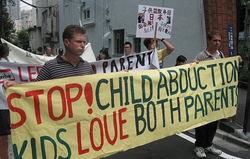November 17, 2014
In 2013, Japan joined the Hague convention on the civil aspects of child abduction. The convention took effect on April 1, 2014. In October 2014, a child has been returned to his father. The boy was born in Germany to a German father and a Japanese mother. He lived in Germany until June 2014 when his parents split and his mother took him back to Japan—a situation all too common for international marriages. While this marks the first time that a child has been returned from Japan to a foreign parent under the Convention, the first case under the Convention occurred in July 2014 and involved a child being returned to Japan from the UK. Two other cases followed in September 2014 and those also involved a child being returned to Japan from abroad. As of November 2014, the Ministry of Foreign Affairs has 14 requests for the return of children from Japan and 9 for the return to Japan. Considering the small differences, these numbers bring about a more pressing question: were Japan’s reasons for not previously adopting the Convention truly justified?

The Hague convention sets rules and procedures for the prompt return of children under the age of 16 to their country of habitual residence. Since the agreement was completed in 1980, 93 states have become members to the convention. The most recent is Japan but it did not come easy. For years, Japan resisted joining the Convention citing a desire to protect Japanese nationals from domestic violence and cultural differences. This resulted in extreme difficulties for parents whose spouse, usually the mother, unilaterally took the children into Japan. The term for this came to be known as a “left behind parent.”
One such parent was Christopher Savoie, a Tennessee man who had two children with his Japanese wife. When the couple divorced, Savoie was awarded custody of the children by the U.S. courts. In 2009, the mother took the children on a trip to Japan but never returned. When Savoie went to Japan to get the kids, he was arrested and detained on charges of kidnapping. Because Japan was not a party to the Convention at that time, Savoie’s only legal recourse would have been to go through the Japanese family courts. However, the U.S. custody award would have done very little to convince the Japanese court to return the children, not to mention the logistics of having to retain a local attorney for the matter. With his only legal recourse rendered futile, Savoie decided on an alternative and it lead to his arrest.
Stories like Savoie’s are common for international marriages between foreigners and Japanese. But while Savoie got noticed, others get lost in the shadows. Of the registered international marriages in Japan in 2009, the year of Savoie’s struggle, 78% were between a Japanese man and a non-Japanese bride. Japan’s reluctance to implement the Hague Convention neglected the needs of its own citizens in international marriages despite the country’s purported reason being a desire to protect Japanese nationals. The current number of Japanese nationals seeking return of their children to Japan under the Convention belies that reason and suggests that there may have been a number of Japanese parents in Savoie’s position that got lost in the shuffle.
Japan is a nation full of history and beauty. It is a nation with some of the kindest and most hospital people that one will meet. Yet, it is also a nation that continues to struggle with a divide between Japanese and non-Japanese. Social customs, laws, and the courts have an uneasy track record of disparately treating non-Japanese nationals and Japan’s long reluctance to accept the Hague convention underscores that divide. But in doing so, Japan may have harmed more of its citizens than it protected. The number of Japanese parents seeking return of their children to Japan under the Hague Convention suggests that there might have been many other parents in Christopher Savoie’s situation: left behind.
Leonard Large is a 3L law student at University of Denver Sturm College of Law and Candidacy Editor for the Denver Journal of International Law and Policy.

